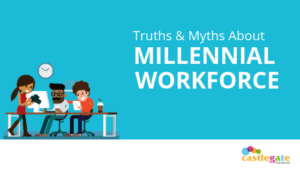“Be kind, don’t judge, and have respect for others. If we can all do this, the world would be a better place. The point is to teach this to the next generation.” – Jasmine Guinness

If you were born between the early 1980s and the mid-1990s, you fall into a category known as “Millennials.” Like any other generation, this term comes with certain preconceptions about your priorities, habits, and work ethic.
Today, Millennials are aging and finding themselves in management positions at work more often. As a millennial, you might face certain stereotypes about your age and generation. We often hear careless throw-away comments in organisations about Millennials that are damaging to their reputation. At their harshest, critics call Millennials soft, entitled, and narcissistic. But these sweeping terms do not apply to all, or even most Millennials, and dispelling myths about Millennials is an important part of creating a harmonious workplace.
If you don’t fall under the Millennial category and you suddenly find yourself under the command of one at work, you might unconsciously or consciously resist their leadership because you fall prey to believing stereotypes about their work ethic and values. Deconstructing these stereotypes and getting the fact-based truths will contribute to a better working environment, while also building and deepening relationships in and out of the workplace.
Myth #1: Millennials are Never Happy with Their Job
Truth: A study in the Journal of Business and Psychology found that Millennials actually report higher levels of job satisfaction, advancement, and career development compared to Gen Xers and Baby Boomers. When it comes to benefits, salary, and the work they do, satisfaction levels were comparable to those of Generation X and Baby Boomer levels.
Myth #2: Millennials Need to Be Babysat at Work
Truth: Millennials are more prepared than ever to take on work tasks. In fact, Millennials are better educated than any generation that has come before them, and they’re also more likely to be skilled in using technology necessary for their job. There are significant advantages to being tech-savvy in this current and beckoning digital age, including time-saving opportunities at work as well as chances to forge professional relationships while you learn or teach each other how to use new technology.
Myth #3: Millennials are Lazy
Truth: The Economist reported on a recent study of 90,000 employees in which 59% of Millennials said competition is the driving force behind doing what they do every day, compared to just 50% of Baby Boomers who say the same.
Myth #4: Millennials Don’t Follow Instructions at Work
Truth: In another poll from The Economist of 5,000 employees, 41% of Millennials asserted that “employees should do what their manager tells them, even when they can’t see the reason for it.” (Not that we agree with this style of leadership!) This is in contrast to just 30% of Baby Boomers and Gen Xers who agreed with this statement.
Myth #5: Millennials Only Want Jobs Where They Can Work from Home
Truth: In a 2016 study of 10 major global markets (including the UK), 4066 people were asked a variety of questions about the workforce, including if they’d prefer to work at home or a corporate setting. The results may be surprising: 41% of Generation Z members said they prefer working in a corporate environment rather than a co-working space or from home, compared to 42% of Millennials who would prefer to work at an office.
What are some preconceived notions you have about Millennials? Are you a Millennial who’s had to challenge stereotypes about your generation at work?
